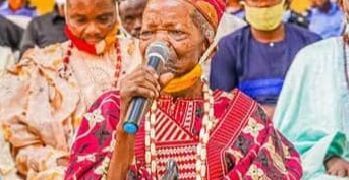Aare Onakakanfo of Yorubaland,Iba Gani Abiodun Ige Adams,has warned criminal herdsmen in the southwest to stay away from the region or face the wrath of the Oodua Peoples Congress(OPC).
Speaking against the backdrop of the recent encroachment of Professor Wole Soyinka’s Ijegba residence by herders, Aare Gani Adams, in a statement by his Special Assistant on Media,Kehinde Aderemi, said the manner of the encroachment was largely a threat to the privacy of the Nobel laureate.
Iba Adams lamented that recent developments, based on the reports available to him across southwest have shown that criminal herdsmen have migrated from Ibarapa,in Oyo state to Yewa in Ogun state, making the state prone to increasing spate of insecurity.
The Yoruba generalissimo also wondered why President Muhammadu Buhari has been so complacent with the growing spate of insecurity across the southwest, declaring that activities of criminal Fulani herdsmen are worrisome and very unbearable.
“We thank God that the recent encroachment on Prof’s residence failed. Prof actually saw it coming but I think the fundamental problem in this country is that we have a president that seems to be complacent on serious issues. It is in our own interest to continue to raise our voices against the unprecedented threats to the southwest region.
The Aare Onakakanfo also urged the southwest governors to boost the recruitment of OPC, Vigilante and Hunters in the south west security Network better known as Amotekun,especially in Ondo state to further strengthen the security outfit in the region.
While appealing to the Lagos state government to inaugurate the state Amotekun and join his counterparts in other southwest states to boost the state security networks,Aare Adams said in case Amotekun needs the help of OPC in enhancing the security operations across the southwest, the group will not hesitate to offer the service.
He, however, restated the need for better coordination, especially, on security issues among the south west governors,saying OPC is ready to offer intelligence report,physical and technical supports to the governors in addressing the menace of herdmen attacks and killings in the region.
“Back then between 1999 and 2005, the OPC became a thorn in the flesh of all criminal elements within the southwest. It was all about the fight against the bad elements that disturbed the peace of our region”
“It was also about the struggle for the liberation.Then we had issues with the police and other security authorities,because we had a limited exposure and experience of how to handle issues without much rigours. Our approach then was not in tandem with the realities of that moment”.
“But today, we have gone beyond those stages,we are now very much organized, experienced, coordinated and resolute. So the OPC has the wherewithal to stop the illegal activities of criminal herdsmen in our region”.
Aare Adams,also advised the southwest governors to reinforce the region with the recruitments of Amotekun personnels, especially, to palaces and homes of prominent people and personalities living in the rural areas and communities across the region, maintaining also that such initiative will reduce the illegal influx of criminal herdsmen and put a stop to the threats to individuals’ lives and property.
“There were reports of some people that were using soldiers to threaten the natives of some communities in Ogun and Ondo states for dislodging illegal herders in their respective communities. The chief of army staff should investigate the reports and bring those behind the reports to book”.
He added that the government across the region should intensify efforts to introduce the Security Trust Funds(STF) as a way of addressing the security deficit at the grassroots.
” Operation Amotekun can also be segmented into two different sections. The first will secure the forests as forest guards against killer herdsmen and the second will take care of the security of people within the urban communities”.
“The two sections will work hand in hand and complement the efforts of all the security operatives.”

















